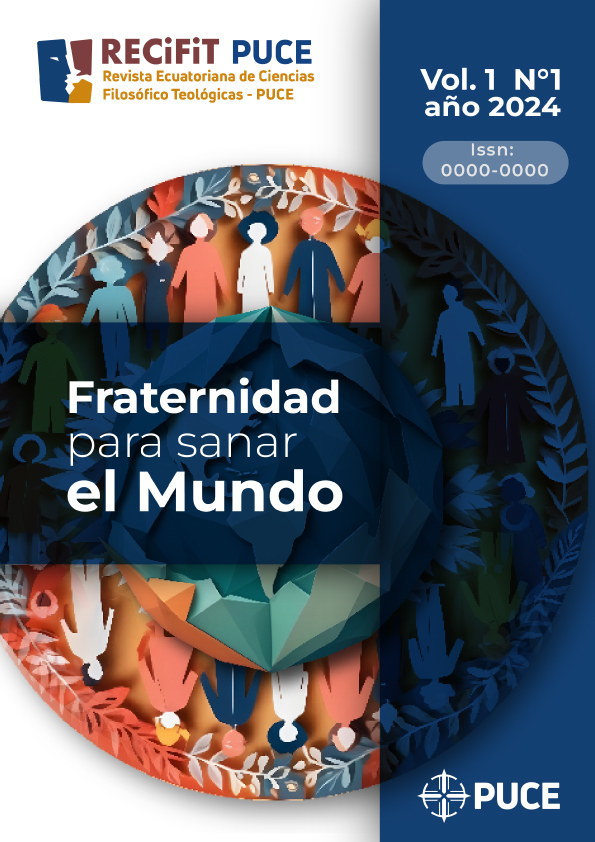Human Fraternity as Responsibility The Exemplary Case of Safeguarding La fraternidad humana como responsabilidad El caso ejemplar del safeguarding
Contenido principal del artículo
Resumen
Starting from Pope Francis’ documents on the theme of fraternity, this contribution aims to show how the ethical call for the healing of the world can find in fraternity a founding element to the extent that it is recognisable at a global level, and therefore regardless any cultural and religious differences. To this end, an attempt will be made to think of human fraternity in the light of a paradigm that can be accepted beyond these same differences. Through reference to some contemporary philosophical reflections (with particular reference to Hannah Arendt’s contribution), this paradigm will be identified in the essentially relational form of human existence. Starting from here, in particular by referring to the thought of Hans Jonas and Emmanuel Lévinas, the concept of fraternity will be thought of in the light of original human responsibility, and conceived as an original attitude in which the person cannot fail to recognise themselves in order to fully realise their identity. Finally, the efficacy of this paradigm will be shown in the exemplary case of the prevention of sexual and other forms of abuse (Safeguarding): only by thinking the abusive act in the light of the relational and contextual dimension in which it occurs, it is possible to understand the socio-cultural attitudes that, in a given context, favour it or at least do not inhibit it, in order to be able to intervene at a preventive level.
##plugins.themes.bootstrap3.displayStats.downloads##
Detalles del artículo

Esta obra está bajo una licencia internacional Creative Commons Atribución-NoComercial 4.0.
Licencia de Acceso Abierto
La Revista Ecuatoriana de Ciencias Filosófico-Teológicas adhiere al modelo Acceso Abierto en el que los contenidos de las publicaciones científicas se encuentran disponibles a texto completo libre y gratuito en Internet, sin embargos temporales, y cuyos costos de producción editorial no son transferidos a los autores. Esta política propone quebrar las barreras económicas que generan inequidades tanto en el acceso a la información, como en la publicación de resultados de investigaciones.
Cómo citar
Referencias
Arendt, H. (1981), The life of the mind, Harcourt Brace Jovanovich.
Arendt. H. (1998), The Human Condition, The University of Chicago Press.
Butenkemper, S. (2023), Toxische Gemeinschaften. Geistlichen und emotionalen Missbrauch erkennen, verhindern und heilen, Verlag Herder.
Butler, J. (1997), The Psychic Life of Power: Theories in Subjection, Stanford University Press
Finkelhor, D. (1984), Child Sexual Abuse: New Theory and Research, Free Press.
Finkelhor, D (1980), Risk Faktors in the Sexual Victimization of Children, Child Abuse and Neglect, 4, 265-273.
Gehlen, A. (2009), Der Mensch. Seine Natur und seine Stellung in der Welt Klostermann.
Gilson, E. C. (2014), The Ethics of Vulnerability, Routledge.
Gilson, E. C. (2016), Vulnerability and Victimization: Rethinking Key Concepts in Feminist Discourses on Sexual Violence, Journal of Women in Culture and Society
Heidegger, M. (2000), Bauen Wohnen Denken in Vorträge und Aufsätze, in Gesamtausgabe, 7, Vittorio Klostermann, 145-164.
Heidegger, M. (2006), Sein und Zeit, De Gruyter.
Jonas H. (1992), Philosophische Untersuchungen und Metaphysische Vermutungen, Insel Verlag.
Jonas, H. (1984), The Imperative of Responsibility. In Search of an Ethics for the Technological Age, University Chicago Press.
Jonas, H. (2001) The Phenomenon of life. Towards a Philosophical Biology, Northwestern University Press (Original work published 1966).
Joulain, S (2018), Combattre l'abus sexuel des enfants: Qui abuse? Pourquoi? Comment soigner?, Desclée De Brouwer.
Lévinas, E. (1991), Totality and Infinity: An Essay on Exteriority, (A. Lingis. Trad. 3th Ed), Kluwer Academic Publishers. (Original work published 1961).
Piccolella, P. (2006), Il limite di Prometeo. Pensare Uomo, Natura e Dio con Hans Jonas, Lithos.
Plessner, H. (1928), Die Stufen des Organischen und der Mensch, De Gruyter.
Plessner, H. (1976), Die Frage nach der Conditio humana: Aufsätze zur philosophischen Anthropologie, Suhrkamp Verlag (Original work 1961).
Pope Francis (2020), Fratelli Tutti. On Fraternity and Social Friendship, https://www.vatican.va/content/francesco/en/encyclicals/documents/papa-francesco_20201003_enciclica-fratelli-tutti.html
Pope Francis, Al-Tayyeb, A. (2019), Human Fraternity. For World Peace and Living Together, https://www.vatican.va/content/francesco/en/travels/2019/outside/documents/papa-francesco_20190204_documento-fratellanza-umana.html
Pulcini, E. (2009), La cura del mondo. Paura e responsabilità nell’età globale, Bollati Boringhieri.
Tedesco, S. (2008) Forme Viventi. Antropologia ed estetica dell’espressione, Mimesis.
Uexküll, von J.J. (2013), Theoretische Biologie, Springer.
Viola F. (2003) La fraternità nel bene comune. Revista de fundamentación de las Instituciones Jurídicas y de Derechos Humanos, 49, 141-161.
Ward, T., Beech, A., (2006), An integrated theory of sexual offending. Aggression and Violent Behavior, 11, 44-63.
World Health Organization, Child Maltreatment, https://apps.who.int/violence-info/child-maltreatment/
Zollner, H. (2022), Die Verantwortung der katholischen Kirche. Die Schaffung einer Kultur des Safeguarding ist integraler Bestandteil kirchlicher Mission, in Die Sternsinger. Kindermissionswerk (Ed.), Dossier Kinderschutz, (pp. 50-59). Aachen
Zollner, H. (2022), Faithful and True? The History of Mentalities and the Catholic Church’s Response to the Sexual Abuse Crises, in Attard S. M, Berry J. A. (Ed.), Fidelis et Verax. Essays in honour of His Grace Mgr Charles J. Scicluna on the tenth anniversary of his episcopal ordination (pp. 601-620). Kite.






